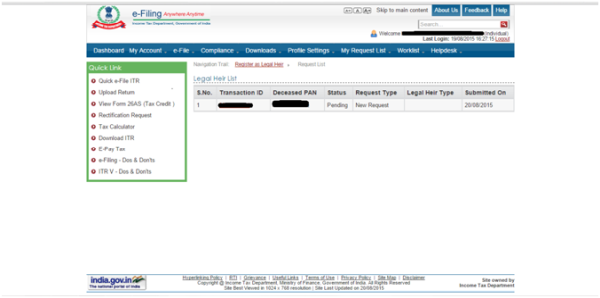When Does The Irs Open For E File 2013

You have three years from the date of the original deadline of the tax return to claim your refund or two years from the date the tax was actually paid, whichever is later. For example, your 2016 tax return is due on April 18, 2017.
TurboTax is Open and Accepting. The TurboTax Blog >Tax News >IRS Announces E-file Opens January 30, 2013. How long does it take for the IRS to accept an E file. Jan 14, 2014 IRS invites taxpayers to come back on January 17 and get in the queue to file for free. But does that mean those returns will be processed early?

If you add three years to this filing deadline, you have until April 18, 2020 to file your 2016 tax return and still get a tax refund. If you wait any later than that, your refund 'expires.' It goes away forever because the statute of limitations for claiming a refund has closed. The due date rule is the one that usually controls the ticking clock, particularly for W-2 employees who have their taxes withheld from their paychecks.
Remember, 'later' is the operative word here. So if you overpaid taxes through withholding that came out of your last paycheck of 2016 – which we'll assume was Dec. 30 if you're paid weekly – this statute of limitations would run only to Dec. Amended returns claiming additional refunds must be filed with the IRS before the three-year statute of the limitations expires, which would be the April 15th due date – unless you filed an. This extends the statute of limitations to October of that year, which is effectively the new due date after you've asked for an extension. The IRS can issue refunds for a particular year if you request an extension and subsequently file a tax return within three years from the extended deadline. Skinsoft Visual Styler Download. There are two exceptions to the three-year statute of limitations on refunds: • Taxpayers have up to seven years to claim a refund resulting from deductions for bad debt or worthless securities.
• The three-year statute of limitations does not apply in situations where taxpayers are unable to manage their financial affairs due to physical or mental impairments. So What Happens to Your Refund If You Don't Collect It?
When a refund expires, the federal government keeps the money. In IRS terminology, it's considered an '. That refund money cannot be sent to the taxpayer, nor can it be applied as a payment toward a future tax year. How To Install Switch On Pfsense. It can't be applied to another year as an estimated payment. The IRS Has Three Years to Audit Your Tax Return This deadline is simpler. It's measured from the day you actually file your tax return unless you filed your taxes before the deadline.
In this case, the clock doesn't begin running until the actual due date – April 18 in 2017. So even if you filed your return in February 2017, the IRS has until April 2020 to initiate an audit. Most state tax agencies follow the federal three-year period for auditing tax returns, but.
There are three exceptions to the 3-year rule on assessments and: • The IRS has six years from the date a return is filed to audit a tax return and to assess additional tax if the taxpayer omits income that amounts to more than 25% of that which was reported on the tax return. • The IRS also has six years to audit a tax return and assess additional tax on income related to undisclosed foreign financial assets if the omitted income is more than $5,000. • The statute of limitations on audits and assessing additional tax remains open indefinitely if the taxpayer files a false or fraudulent tax return.
The IRS Has 10 Years to Collect Outstanding Tax Debts This is measured from the day a tax liability has been finalized, which can happen in a number of ways. Your liability may be considered finalized because it's the amount of tax reported on a tax return that you've filed, because it's an assessment of additional tax from an audit, or because it's a proposed assessment that has become final. The IRS has 10 years to collect the full amount from the day a tax liability is finalized, plus any penalties and interest. If the IRS doesn't collect the full amount in the 10-year period, the remaining balance disappears forever because the statute of limitations has expired. You're off the hook.
The 10-year statute of limitations on collections can be suspended in the following situations: • While the IRS is reviewing an offer in compromise, installment agreement, innocent spouse relief, collection due processing hearing • While a taxpayer is under the automatic stay of bankruptcy protection plus an additional six months, • For periods when the taxpayer resides outside the U.S. For at least six months. Using Time Limits to Plan Your Taxes It's in your best interest to file your tax returns at your earliest possible convenience. First, you can claim any refund that is due you.